Week ahead in Parliament
- Published
- comments
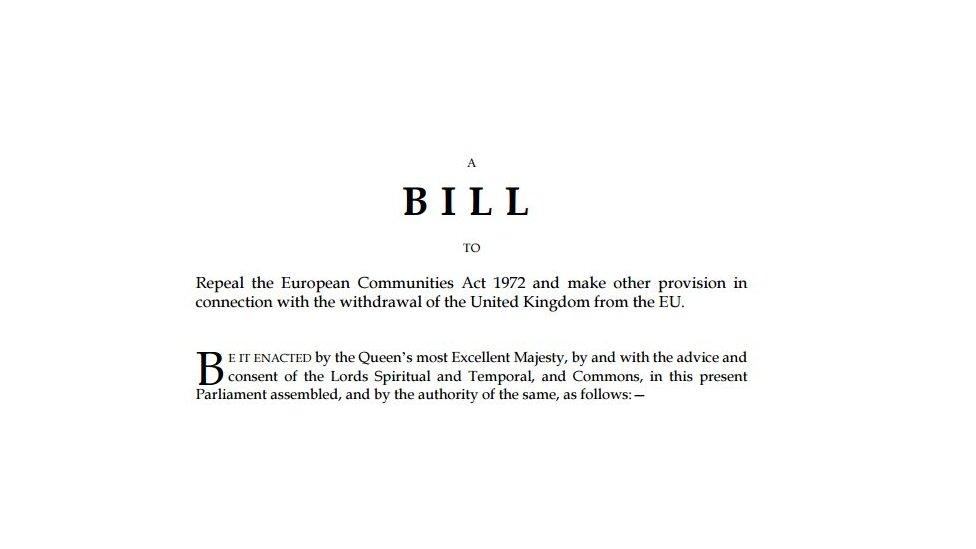
The bill finally makes it to committee stage in the House of Commons
As we pass the half way point between the referendum and Brexit day, the detailed legislative battle finally commences.
The Parliamentary week will be dominated by the first two days of committee stage scrutiny of the EU (Withdrawal) Bill - the measure which provides the government with a vast range to legislative tools so that it can enact whatever version of Brexit it ultimately decides upon.
As I write, my desk groans under the weight of the latest 175-page amendment paper, containing 366 amendments (14 have been withdrawn) and 74 new clauses, covering just about every imaginable issue, external.
There will be eight days of committee stage on the floor of the Commons, with at least two days of report stage to follow, before the bill is sent on for more fun and games in the House of Lords.
I will be writing a more extensive preview separately - but this could turn into an attritional Commons battle to rank with the legendary 1990s clashes over the Maastrict Treaty.
Here's my rundown of the week ahead:
Monday
The Commons opens (2.30pm) with Work and Pensions questions. Expect any post-half term urgent questions or statements (and there could be a few....) at 3.30pm.
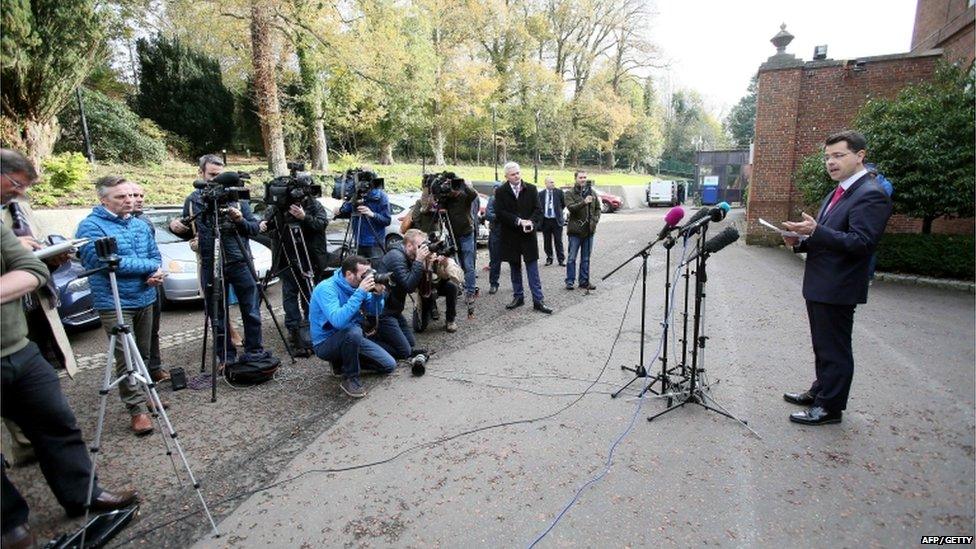
Northern Ireland Secretary James Brokenshire gives an update on the negotiations in Northern Ireland
The main event is the Northern Ireland Budget Bill, external - all stages of which will be taken at a single gulp. This is the measure to set government spending plans for Northern Ireland, in the continuing absence of the Stormont Assembly.
In Westminster Hall (4.30pm), MPs debate two opposed e-petitions; no 180642, external which says "Another Scottish independence referendum should not be allowed to happen....We in Scotland are fed up of persecution by the SNP leader who is solely intent on getting independence at any cost. As a result, Scotland is suffering hugely." and no 168781, external which says "Agree to a second referendum on Scottish Independence...The actions of the UK government after the Brexit vote do not align with the people of Scotland. We are not bigoted. We are not racist. We welcome everybody based on their contribution, not on where they come from. The UK government does not behave in this way and so we must LEAVE."
In the Lords (2.30 pm) question time ranges across the eventual financial settlement with the EU, the increase in the number of penalty points imposed under a fixed-penalty notice issued for drivers caught using mobile phones, payment of Disabled Students' Allowance to dyslexic students and the ratio of overseas aid expenditure to defence expenditure.
A pretty perfunctory committee stage debate on the European Union (Approvals) Bill, external with then follow. The bill approves EU Council decisions on observer status for Serbia and Albania in European Agency for Fundamental Rights, and to conclude an EU- Canada agreement on competition.
Much meatier is the next agenda item - the third committee day on the Data Protection Bill,, external where the focus is on the sections dealing with controls on general processing of personal information and law enforcement processing.
During the dinner break there will be a short debate on the government's assessment of the risks posed by household debt in the UK - led by the Bishop of St Albans, Rt Rev Dr Alan Smith.
Tuesday
MPs open (11.30 am) with Health questions - and with eight hours of committee stage debate in prospect (see below) there would have to be something pretty urgent to justify an urgent question or statement, without provoking considerable grumbling.
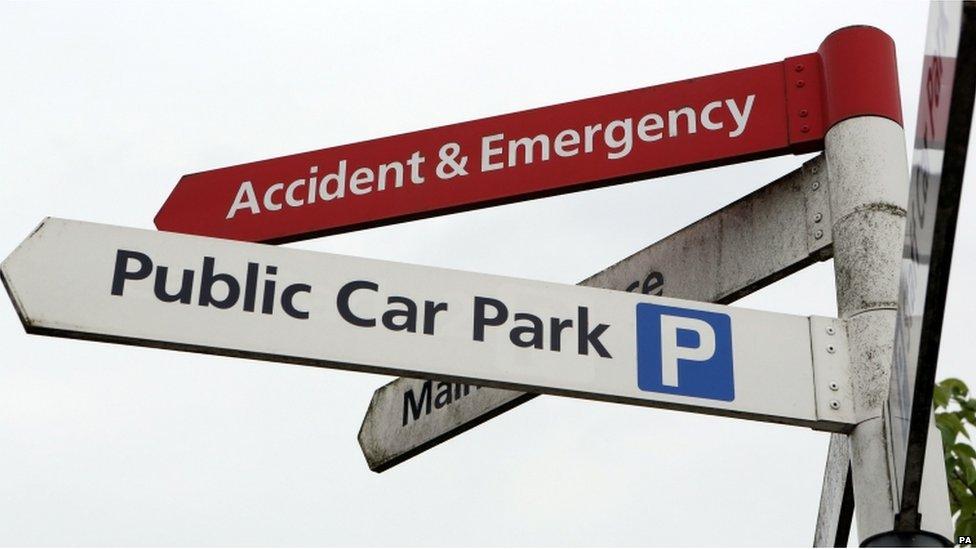
The day's Ten Minute Rule Bill, from the Conservative former minister, Robert Halfon, is on the abolition of hospital parking charges, an issue he's been campaigning on since 2014 - when, he says, he discovered hospitals in England were charging staff and visitors up to £500 a week to park. "It was never envisaged that people with cars would end up paying for the NHS," he said.
Then it's on to the main event - the first of eight committee stage days on the floor of the House, on the detail of the European Union (Withdrawal) Bill, external.
The action will focus on Clause 1 and Clause 6. Clause 1 is a single line, repealing the 1972 European Communities Act, the legislation that took Britain into what was then the EEC. It will take effect on Brexit Day. Its effect is to return sole competence to Westminster to legislate over policy areas currently under the EU.
Clause 6 is a much more complex clause, instructing the courts on how to interpret the 40 years of accumulated EU law that will (mostly) be reprocessed into British law, and makes clear that UK courts will no longer have to follow the judgments of the European Court of Justice.
On Clause 1, there are amendments down setting conditions for leaving.
Labour Remainer Chris Leslie's amendment 53 saying that repeal cannot take place until a new treaty on the future relationship with the EU has been approved, and his amendment 63 to keep Britain in the Customs Union have both attracted 27 signatures. The SNP's Iain Blackford has an amendment which would retain membership on existing terms if Parliament does not agree the exit deal, and Plaid Cymru's Hywel Williams has an amendment requiring the devolved parliaments to consent to repeal.
On Clause 6 there are several official Labour amendments, which set out an assortment of conditions for transitional and continued protection of social rights.
In Westminster Hall, there are debates on International Men's Day (9.30am); the long-term future of district councils in England (11am); the UK's role in degradation of the marine environment (2.30pm); the government response to corrosive substance attacks (4pm) and the UK bee population (4.30pm).
In the Lords (2.30pm) question time covers planning for another generation of New Towns, foreign policy support for UK businesses seeking global trade opportunities, and the effect of Brexit on UK food prices.
The main legislating is on the Northern Ireland Budget Bill, which as a money bill would normally be rubber-stamped by peers. That is followed by the Space Industry Bill, external - where there are report stage amendments down on such issues as space debris, safety and environmental issues.
Wednesday
The Commons opens (11.30 am) with Northern Ireland questions, followed, at Noon by Prime Minister's Questions.
The day's Ten Minute Rule Bill is the Automatic Electoral Registration (No.2) Bill from the Labour MP Jo Stevens. It aims to increase the accuracy of the register of voters, and ensure full enfranchisement through automatic registration. (It's the No 2 Bill because there is a parallel bill in the Lords from Labour's Baroness McDonagh.)
Then it's back to the European Union (Withdrawal) Bill - and day 2 of committee of the whole House, which is focused on clauses 2, 3 and 4. Together, these create a new category of domestic law for the United Kingdom: retained EU law - all of the converted EU law and preserved EU-related domestic law which was in force on the day before the UK left the EU.
Some elements, like rights under the Charter of Fundamental Rights, are excluded from this category. Clause 5 (4) says: "The Charter of Fundamental Rights is not part of domestic law on or after exit day." Retained EU law may subsequently be amended, replaced or repealed by the UK Parliament.
There are a couple of official Labour amendments aimed at making sure that the bill's powers to alter the law could not be used to water down employment rights, health and safety or equality provisions.
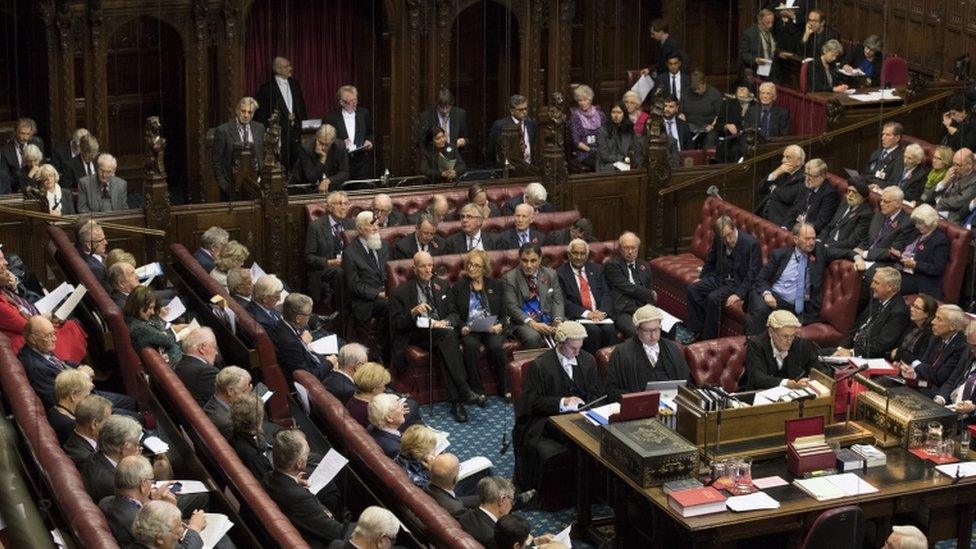
MPs will debate a report of the Lords Speaker's Committee on reform of the Lords
Watch out, too, for the Labour MP Kate Green's amendment to write the UN Convention on the Rights of the Child into UK law - 33 MPs have signed it so far. There's a new clause (NC60) designed to retain the environmental principles of EU law is proposed by the Environmental Audit Select Committee Chair, Mary Creagh, and a cross party alliance is proposing another new clause (NC30) to transfer the EU protocol on animal sentience into domestic law.
In Westminster Hall, there are debates on the report of the Lord Speaker's Committee on reform of the House of Lords (9.30am); private landlord licensing (11am); family justice reform (2.30pm) and the effect of loneliness on local communities (4.30pm).
In the Lords (from 3pm) ministers will field questions on the opportunities from the fourth industrial revolution, the English Churches and Cathedrals Sustainability Review and self-determination for West Papua.
Then peers embark on their fourth committee stage day on the Data Protection Bill, focussing on the clauses on processing of personal data by the intelligence services.
The day's first legislation is all stages of the Finance Bill, external - which picks up measures from the March Budget which were delayed because of the general election. Again, as a money bill, this would not normally attract amendments from peers - although there might be some Paradise Papers-related comment about the need to clamp down on tax avoidance.
Thursday
The Commons begins (9.30am) Digital, Culture, Media and Sport questions, followed by a 20-minute mini-question time for the Attorney General and then the weekly Business Statement from the Leader of the House, Andrea Leadsom.
Next comes a backbench debate on the roll-out of universal credit - this could be interesting from a number of points of view. The Labour Chair of the Work and Pensions Committee, Frank Field, has been pushing the government hard on one key facet of the new super-benefit, the six week wait before claimants receive money. The committee's latest report, external found that many claimants have found themselves unable to cope with the long wait for their initial UC payment, adding that the "long wait for support may even make it more difficult for claimants to search for work".
First, this is an attempt by a select committee to drive government policy. Second, Mr Field's motion "calls on the government to reduce the standard initial wait for a first Universal Credit payment to one month". Given the accusations that ministers have effectively ignored votes calling for a change in policy on Opposition Day motions, including on universal credit, and have instructed Conservative MPs not to take part in them, it will be interesting to see how the new management in the government whips office handles this debate.
In this context, it's worth remembering how events unfolded in the run-up to George Osborne's u-turn on his tax credit cuts in his 2015 Budget. Tory MPs wouldn't support a Labour motion opposing the cuts, but enough of them did turn out to support the select committee one. Mr Osborne knew after that vote that he wouldn't have a majority in the Commons, let alone the Lords.
The day's second backbench debate is on the defence aerospace industrial strategy.
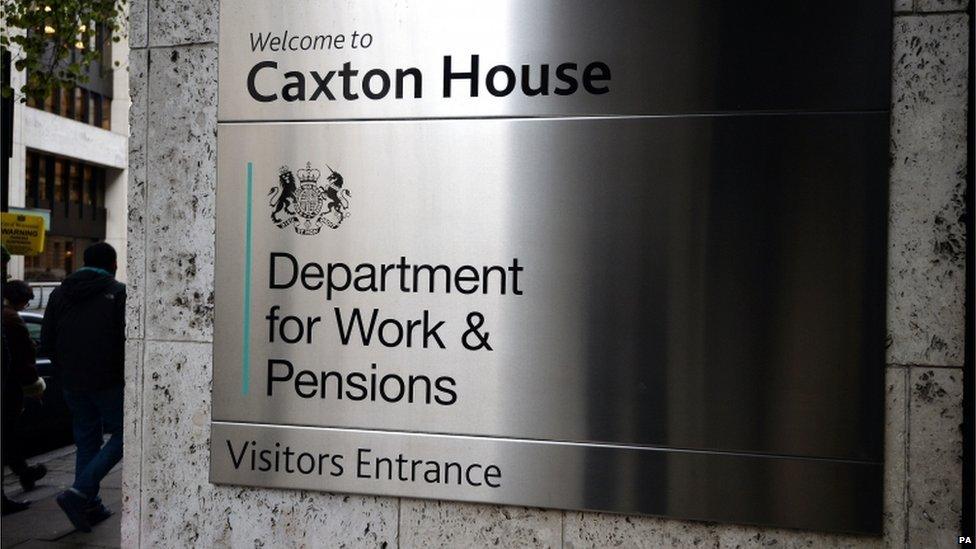
Meanwhile, in Westminster Hall (1.30 pm) there is a general debate on World Antibiotics Awareness Week, followed (3pm) by a general debate on the Department for Work and Pensions support for care leavers.
In the Lords (11am) proceedings open with the introduction of Lord Geidt, who served as the Queen's private secretary for 10 years.
Question time covers bilateral trade between the UK and Sudan, the number of young women who are self-harming and whether the EU will accept British data protection laws are adequate to allow data transfers between the UK and the EU after Brexit.
The day's debates are on subjects raised by Labour peers, starting with the former welfare minister Baroness Hollis of Heigham on the impact of universal credit on claimants - a debate which has attracted 19 speakers, so far, a good showing for a Thursday afternoon.
Another former minister, Lord Foulkes leads a debate on the human rights of older persons, and then, Lord Hunt of Kings Heath has a motion to regret new regulations on NHS charges to overseas visitors.
The dinner break debate is on the impact of rising inflation on families affected by the freeze of working age benefits - led by the Bishop of St Albans, Rt Rev Dr Alan Smith, in his second foray into this area in a week.
Neither House sits on Friday.